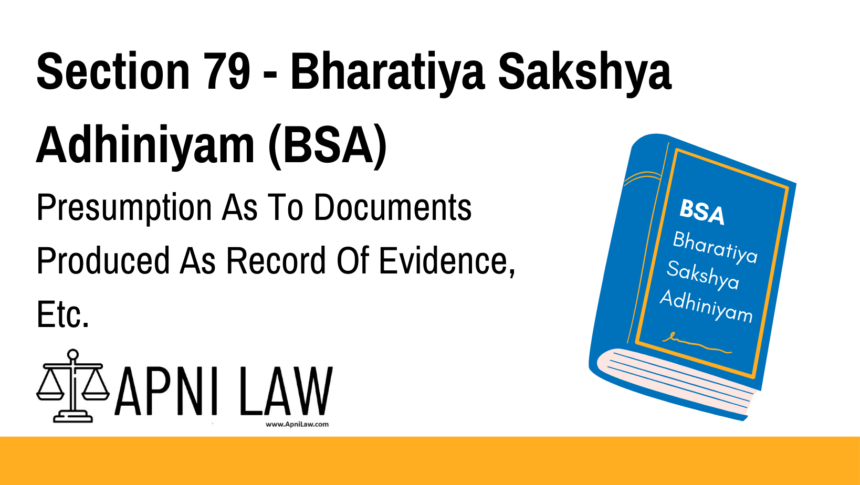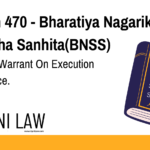Code: Section 79 of Bharatiya Sakshya Adhiniyam, 2023
Whenever any document is produced before any Court, purporting to be a record
or memorandum of the evidence, or of any part of the evidence, given by a witness in a
judicial proceeding or before any officer authorised by law to take such evidence or to be a
statement or confession by any prisoner or accused person, taken in accordance with law, and purporting to be signed by any Judge or Magistrate, or by any such officer as aforesaid,
the Court shall presume that—
(i) the document is genuine;
(ii) any statements as to the circumstances under which it was taken, purporting
to be made by the person signing it, are true; and
(iii) such evidence, statement or confession was duly taken.
Explanation of Section 79 BSA
Section 79 of the Bharatiya Sakshya Adhiniyam, 2023 lays down the presumption that applies when documents are presented as records of evidence or statements made by witnesses, prisoners, or accused persons in judicial proceedings.
Under this section:
- If a document is presented as a record of evidence, statement, or confession made in a judicial proceeding or before an authorized officer, and it is signed by a Judge, Magistrate, or the authorized officer, the Court will presume that:
- The document is genuine: The document is considered authentic and legally valid without requiring further verification.
- The statements regarding the circumstances of the document’s creation are true: Any statements made by the person who signed the document about the circumstances under which it was taken are presumed to be accurate.
- The evidence, statement, or confession was properly recorded: The document is presumed to be properly created in accordance with the law.
This section provides a strong legal presumption to avoid the need for additional proof or scrutiny when such documents are produced in court.
Illustration
Example: Admissibility of a Confession Record
A confession made by an accused person is recorded by a Magistrate and signed by them. When the document is produced in court, it is presumed:
- The confession record is genuine.
- The circumstances under which the confession was made, as described by the Magistrate, are true.
- The confession was properly recorded in accordance with the law, and thus can be admitted as evidence without requiring further verification.
Common Questions and Answers on Section 79 BSA
1. What does “presumption of genuineness” mean in this context?
It means that the Court will automatically assume that the document is authentic and accurate, without requiring further proof unless there is a specific challenge to its authenticity.
2. Does this section apply only to confessions?
No, Section 79 applies to any document purporting to be a record of evidence or statements made by witnesses or accused persons in judicial proceedings, including confessions.
3. Can the authenticity of the document be challenged in court?
While the Court presumes the document to be genuine, this presumption can be rebutted by showing evidence that the document is not authentic or that it was not properly signed or recorded.
4. Does this presumption apply to all signed documents in judicial proceedings?
Yes, as long as the document is signed by a Judge, Magistrate, or authorized officer, and it relates to evidence, statements, or confessions taken in accordance with the law, the presumption applies.
5. How does this presumption help the legal process?
This presumption simplifies judicial proceedings by reducing the need for verifying the authenticity of every document presented in court, thus streamlining the process and ensuring efficiency in legal proceedings.
Conclusion
Section 79 of the Bharatiya Sakshya Adhiniyam streamlines legal proceedings by establishing a strong presumption of authenticity for documents related to evidence, statements, and confessions made in judicial proceedings. This provision ensures that such documents are admitted as evidence without unnecessary delays or challenges, unless there is clear evidence to the contrary.
For further details on evidentiary laws and legal presumptions, visit ApniLaw.








